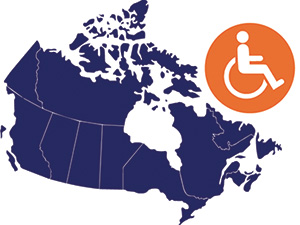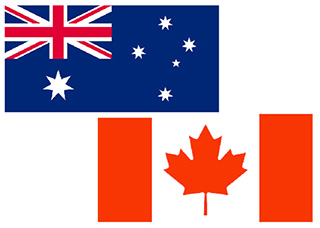Every Canadian Counts
 Canada is working to develop a national plan to make sure support is available for all Canadians with long-term disabilities. They have set up a coalition of people with disabilities, carers and advocates called Every Canadian Counts. The coalition explains that the need for a new system is due to the broken and fragmented existing one. The current system has long waiting lists for people to get support and then the support is often not enough to meet the person’s needs.
Canada is working to develop a national plan to make sure support is available for all Canadians with long-term disabilities. They have set up a coalition of people with disabilities, carers and advocates called Every Canadian Counts. The coalition explains that the need for a new system is due to the broken and fragmented existing one. The current system has long waiting lists for people to get support and then the support is often not enough to meet the person’s needs.
These are much the same reasons that the NDIS was proposed here in 2011 – along with the Organisation for Economic Cooperation and Development’s (OECD) report that placed Australia last in the list of countries for the average income received by people with disability.
The report found that 45 per cent of people with disability in Australia were living in or near poverty, the worst in the OECD, where the average is 22 per cent. The report, Sickness, Disability and Work: Breaking the Barriers published in 2010, also listed Australia in the bottom third for employment levels for people with disability.
Canada has a better starting point in these areas than we do, being listed just outside of the top 10 countries (out of 29) for employment and income figures. Although Canada is still substantially behind those at the top of list, including Switzerland, Finland, Norway and Mexico.
What’s happening in Finland?
Finland’s very effective system seems to have a national legislation and main funding body, like the NDIS and that proposed by Canada, but also has a strong system of local services paid for and organised by local councils.
While Kela, the social insurance institution of Finland, provides disability allowances on a national basis, municipalities, or local councils, have to provide and organise services for people with disability who live in that council area. This includes transport and assistant services.
The success of their system likely comes down to funding though, along with their strong culture of social support and insurance provided through the government.
Canada meets Australia
 Canada’s Disability Minister, Carla Qualtrough, was in Australia in March to meet with federal politicians and attend a disability conference. While she was in Australia she spoke about the current political debate here around raising funds to pay for the NDIS as well as the new system being proposed in Canada.
Canada’s Disability Minister, Carla Qualtrough, was in Australia in March to meet with federal politicians and attend a disability conference. While she was in Australia she spoke about the current political debate here around raising funds to pay for the NDIS as well as the new system being proposed in Canada.
In an interview with ABC News, Ms Qualtrough said that governments should think about the big picture when talking about funding for disability support.
"You have to take a whole-of-government approach to this I would say for sure," Ms Qualtrough said.
"I think you need again to fundamentally shift the conversation to one of citizenship and full rights and full participation."
Ms Qualtrough, a former Paralympian, also talked about her work with Every Canadian Counts to develop Canada's first national accessibility laws for people with disability. She explained that the laws would focus on what businesses and systems, like banks, telecommunications services, rail and airline systems and government employers needed to do to support people with disability.
"Say a bank, we will tell a bank what policies it has to have in place, the practices it has to pursue in terms of hiring, the built environment standards, what it's physical space has to look like and of course what kind of customer service it has to give people with disabilities.
"If that's not being provided there will be a system of penalties, there'll be a compliance regime."
NDIS held up as an example
 The NDIS is featured on the Every Canadian Counts website as an example and as a call to action for a national approach to supporting and providing services to people with disability. This interest shows that the reasons the NDIS was developed and the nationwide model is sound. Hopefully the system will work well in practice once it is fully up and running and that enough funding is found to support it.
The NDIS is featured on the Every Canadian Counts website as an example and as a call to action for a national approach to supporting and providing services to people with disability. This interest shows that the reasons the NDIS was developed and the nationwide model is sound. Hopefully the system will work well in practice once it is fully up and running and that enough funding is found to support it.
You can read the full interview with Ms Qaultrough on the ABC News website
You can also find out more about Every Canadian Counts online


